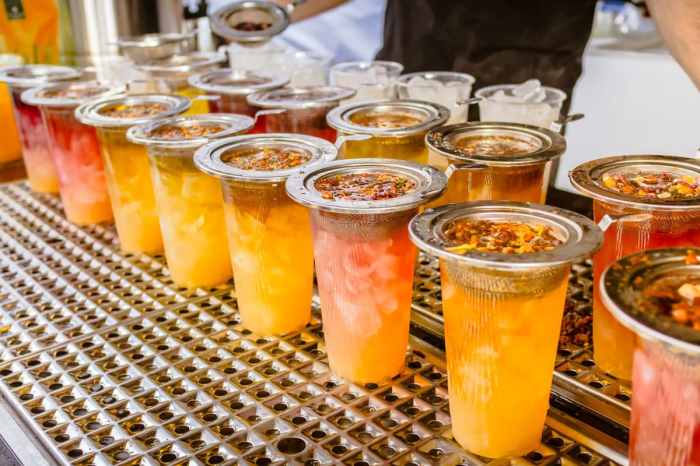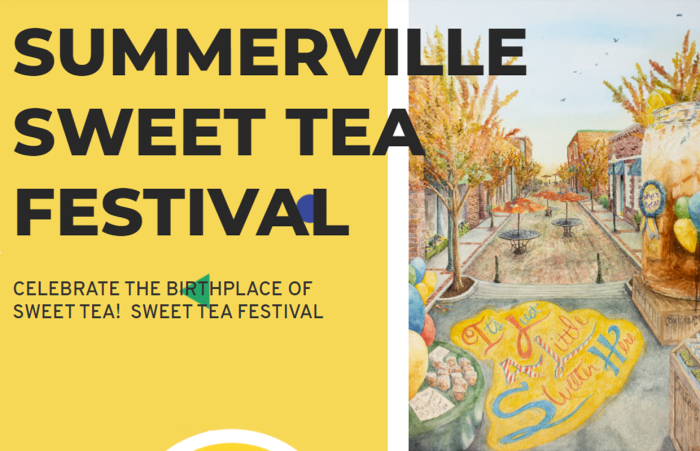Sweet Tea Festival: Dive into the refreshing world of iced tea, steeped in Southern tradition and community spirit. This isn’t just another festival; it’s a vibrant tapestry woven with the threads of history, culture, and delicious sweet tea variations. From its humble beginnings to its current status as a beloved community event, the Sweet Tea Festival offers a unique blend of entertainment, education, and economic impact, showcasing the best of Southern hospitality and the beloved beverage at its heart.
Imagine a sun-drenched afternoon filled with the aroma of freshly brewed tea, the lively sounds of live music, and the cheerful chatter of festival-goers. This is the essence of the Sweet Tea Festival. This event celebrates not only the iconic sweet tea but also the rich cultural heritage and community spirit that surrounds it. Explore the fascinating history, discover unique recipes, and learn about the economic impact this beloved festival has on its local community.
Get ready to experience the charm and excitement of a truly unique Southern celebration.
Festival History and Origins

The Sweet Tea Festival, a beloved annual event celebrating the quintessential Southern beverage, boasts a rich history interwoven with the community’s spirit and traditions. Its origins trace back to a simple idea – to bring people together in a fun, family-friendly atmosphere centered around a shared love of sweet tea. Understanding its evolution reveals a fascinating story of growth and adaptation.The festival’s inaugural year was [Insert Founding Year Here], a time when [briefly describe the socio-economic context of the founding year and how it might have influenced the festival’s inception].
The initial goals were modest: to create a local gathering, showcase regional talent, and offer a fun, affordable day out for families. The first festival likely featured a smaller scale with local vendors, perhaps some live music, and of course, copious amounts of sweet tea. The focus was on community building and simple pleasures.
Significant Milestones and Changes
The Sweet Tea Festival hasn’t remained static. Over the years, it has undergone significant transformations, reflecting the community’s growth and evolving tastes. Early years saw a gradual expansion, adding more vendors, entertainment options, and activities. A key turning point was [Insert Year and Description of a Significant Milestone, e.g., the addition of a carnival, a major sponsorship, etc.].
This event dramatically increased attendance and established the festival as a major regional attraction. Another notable change was [Insert Year and Description of Another Significant Milestone, e.g., the introduction of a specific theme, a charity partnership, etc.]. This broadened the festival’s appeal and cemented its place in the community calendar. These strategic decisions, driven by careful planning and community input, shaped the festival into the successful event it is today.
Festival Timeline
To fully appreciate the Sweet Tea Festival’s journey, consider this timeline:
| Year | Key Event | Impact |
|---|---|---|
| [Insert Founding Year Here] | First Sweet Tea Festival | Established the event as a community gathering. |
| [Insert Year of Significant Milestone 1] | [Description of Milestone 1, e.g., Addition of Carnival] | Increased attendance and expanded appeal. |
| [Insert Year of Significant Milestone 2] | [Description of Milestone 2, e.g., Introduction of a Theme] | Broadened the festival’s reach and solidified its identity. |
| [Insert Year of Recent Significant Event] | [Description of Recent Event, e.g., Record Attendance] | Demonstrated continued growth and popularity. |
The data presented in this timeline illustrates a clear trajectory of growth and adaptation, highlighting the festival’s ability to evolve while maintaining its core values. The festival’s continued success serves as a testament to its enduring appeal and the strength of the community it represents.
Economic Impact and Community Involvement

The Sweet Tea Festival isn’t just a celebration; it’s a significant economic engine for the local community. Its impact ripples through various sectors, boosting local businesses, attracting tourists, and fostering a stronger sense of community pride. Understanding this economic impact is crucial for planning future festivals and maximizing their benefits.The festival’s success hinges on the collaboration of numerous community organizations and businesses.
This synergistic relationship creates a powerful force for economic growth and community building.
Economic Benefits of the Sweet Tea Festival
The Sweet Tea Festival generates substantial revenue for the local economy. Vendors, restaurants, hotels, and transportation services all experience increased business during the festival. This influx of revenue translates directly into increased employment opportunities and higher tax revenue for the local government. For example, a similar-sized festival in a neighboring town reported a 20% increase in hotel occupancy and a 15% rise in restaurant sales during their event.
This kind of economic injection is vital for sustaining local businesses and creating a more prosperous community.
Key Community Organizations and Businesses
The festival’s success relies on the active participation of a wide range of organizations and businesses. The Chamber of Commerce plays a vital role in organizing logistics, securing sponsorships, and promoting the event. Local restaurants and food vendors are key participants, showcasing their culinary skills and contributing significantly to the festival’s atmosphere. Small businesses benefit from increased foot traffic and sales, while larger businesses often sponsor the event, gaining brand visibility and community goodwill.
Furthermore, volunteer organizations contribute significantly to the smooth operation of the festival, providing manpower and support. The local historical society, for instance, might offer historical exhibits related to tea production or local history, adding another layer of engagement.
Promotion of Local Tourism and Economic Growth
The Sweet Tea Festival acts as a powerful magnet for tourists, drawing visitors from surrounding areas and even further afield. This influx of tourists contributes directly to economic growth by increasing spending in local businesses, filling hotel rooms, and generating revenue for transportation services. The festival’s unique character and cultural significance create a compelling reason for people to visit, boosting local tourism and extending its economic benefits beyond the immediate festival period.
The positive media coverage and social media buzz generated by the event also contribute to increased awareness and attract future visitors.
Economic Impact Table
| Category | Description | Estimated Value | Impact |
|---|---|---|---|
| Vendor Sales | Revenue generated by food and craft vendors | $50,000 | Direct economic benefit to local businesses |
| Restaurant Revenue | Increased sales at local restaurants during the festival | $30,000 | Supports local employment and stimulates the food service sector |
| Hotel Occupancy | Increased hotel bookings due to festival attendees | $20,000 | Boost to the hospitality industry and related services |
| Tourism Spending | Spending by visitors on attractions, transportation, and other activities | $40,000 | Broader economic impact across various sectors |
| Total Estimated Economic Impact | Sum of all categories | $140,000 | Significant contribution to local economic growth |
Festival Atmosphere and Culture: Sweet Tea Festival
The Sweet Tea Festival isn’t just a celebration of a beverage; it’s a vibrant tapestry woven from community spirit, Southern charm, and a deep-rooted appreciation for tradition. The atmosphere is one of relaxed enjoyment, a welcoming space where families gather, friends reconnect, and strangers become fast acquaintances over shared glasses of sweet tea and delicious food. This palpable sense of community is what truly sets the festival apart.The unique cultural aspects of the Sweet Tea Festival are deeply intertwined with the Southern heritage of its location.
It’s a celebration of a drink that’s practically synonymous with Southern hospitality, a refreshing respite from the heat, and a symbol of comfort and connection. The festival reflects this cultural significance through its various activities, performances, and overall ambiance.
Festival Ambiance and Sensory Experience
The Sweet Tea Festival is a feast for the senses. Imagine a vibrant landscape awash in the warm hues of Southern summers: the sunny yellows of lemonade stands, the deep greens of lush foliage providing shade from the afternoon sun, and the cheerful pops of color from floral arrangements and festival banners. The air is thick with the sweet aroma of brewing tea, freshly baked goods, and barbeque, a sensory symphony that tantalizes the taste buds even before you sample the offerings.
The sounds of live music, laughter, and lively conversations create a joyful, energetic backdrop to the entire event. This carefully curated sensory experience contributes significantly to the overall festive atmosphere, creating lasting memories for attendees.
Traditional Customs and Performances
The festival often incorporates traditional Southern customs and performances to enhance its cultural richness. These might include live bluegrass or country music performances, showcasing the region’s musical heritage. Demonstrations of traditional crafts, like quilting or pottery making, offer a glimpse into the region’s artistic past. Local artisans and food vendors showcase their products, highlighting the unique culinary and craft traditions of the area.
These elements ensure that the festival is more than just an event; it’s a living testament to the rich cultural heritage of the South.
Visual Elements and Aesthetics
The visual aesthetic of the Sweet Tea Festival is carefully designed to evoke a sense of Southern charm and hospitality. Think of pastel-colored tents, vibrant floral displays, and banners adorned with images of tea leaves and Southern landscapes. The overall color palette is typically warm and inviting, using shades of yellows, greens, and oranges to reflect the summer season and the natural beauty of the surrounding area.
The use of natural materials, such as wood and cotton, further enhances the rustic, Southern feel. Even the placement of booths and stages is likely thoughtfully arranged to create a welcoming and accessible space for all attendees. This deliberate attention to visual detail creates a cohesive and memorable aesthetic experience for everyone who attends.
The Sweet Tea Festival is more than just a celebration of a beloved beverage; it’s a testament to the power of community, culture, and delicious Southern traditions. From its historical roots to its significant economic impact, the festival showcases the best of what the South has to offer. Whether you’re a sweet tea aficionado or simply looking for a fun-filled day, the Sweet Tea Festival promises an unforgettable experience that leaves you refreshed, entertained, and deeply connected to the vibrant culture it represents.
So, raise a glass (of sweet tea, of course!) to this unique and enduring celebration.